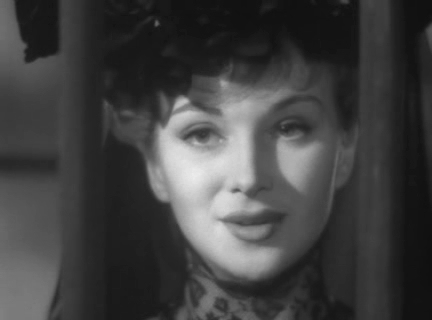The Murder Bouquet

Is it appropriate to wonder whether a villain would be happier married to another villain or to a virtuous person whose faith and position are conducive to further villainy? We're dealing with a subcategory of morality where the main category has already been violated, of course, yet this question is one of the things that makes 1949's Kind Hearts and Coronets so wonderful. The other thing, of course, is the delight inherent in sharing the exploits of an utterly unrepentant serial killer.
When we meet Louis (Dennis Price) at the beginning of the film, he's already the Duke of Chalfont and already in a cell awaiting the hangman's noose in the morning. To pass the time he writes his memoirs, the tale of how, to avenge his ostracised mother, he killed six of her relatives, all individuals in the line of succession to the dukedom ahead of Louis.

All six of Louis' victims, and two more individuals who die on their own, are played by Alec Guinness. Guinness does a brilliant job in each role and though the device is amusing it somehow doesn't deflate the gravity of Louis' crimes. He feels sorry about having to kill a woman who happens to be in a boat with one of his victims but is not heart broken. He's glad when he doesn't have to kill the Alec Guinness who got him a decent job in the family bank because he dies of a stroke. He's sorry to have to kill the affable photographer Alec Guinness.
But he seems to feel all his regrets with the depth most of us would feel at being unable to attend the wedding of a dear old friend. Louis does evince some passion when he confronts the duke himself and tells him, before he kills him, why he's carried out this campaign of systematic murder.

This he's very clear about, the motivation he's carried since the duke denied his mother's dying wish to be buried in the family plot. His feelings regarding the two young women in his life are subtly conveyed through story and performance as being much less clear to him.

Sibella is his first love. He meets her in school and her father, a doctor, takes him in when his mother dies without being able to bequeath him her annuity. So he's forced to take a job as a draper, something he considers deeply humiliating. It's because of this Sibella, despite having affection for Louis, doesn't hesitate before accepting the marriage proposal of a man with wealth and position. She also delights in tormenting Louis with this state of affairs.

As Louis' position in the world starts to look better after a couple Alec Guinnesses have perished, she begins to meet Louis in his apartment entirely for the purpose of sleeping with him.

She asks him to tell her how he would describe her to someone else.
"I'd say that you were the perfect combination of imperfections. I'd say that your nose was just a little too short. Your mouth just a little too wide. But that yours was a face that a man could see in his dreams for the whole of his life. I'd say that you were vain, selfish, cruel, deceitful. I'd say that you were adorable. I'd say that you were . . . Sibella."
She loves this description so much she asks him to repeat it before they make love.
The other woman is the widow of the photographer Alec Guinness, a woman of fundamental virtue whom Louis regards as being a sort of aesthetically suitable duchess for him.

One likes both women but perhaps wishes to see Louis and Sibella end up together a little more. That the heart automatically wishes for the happiness of a serial killer probably says something about human nature. What is admirable about Louis? He's a man of conviction, who hasn't the slightest inhibition about pursuing what he wants and what he feels is right. He's a psychopath and as is sometimes the case with psychopaths, extremely charming for it.
Twitter Sonnet #547
A round rubber coat looks up from slumber.
A pruned sun gazes purply through cardboard.
Caravans of spines rattle on lumber.
Cotton sticks to where pages are harboured.
Galloping cattails trampled the coke cup.
No-one wonders where kelpie buy produce.
Social fungi greet toes in the stirrup.
Reeds clasp the rail of the drifting caboose.
A beige plastic bridge reached over the pond.
A stone eyebrow disapproved of a web.
The old yellow cowboy dyed his hair blonde.
Lando won at the Battle of Taanab.
Drama grasps the invisible torso.
Airplane spies don't crack under the lasso.